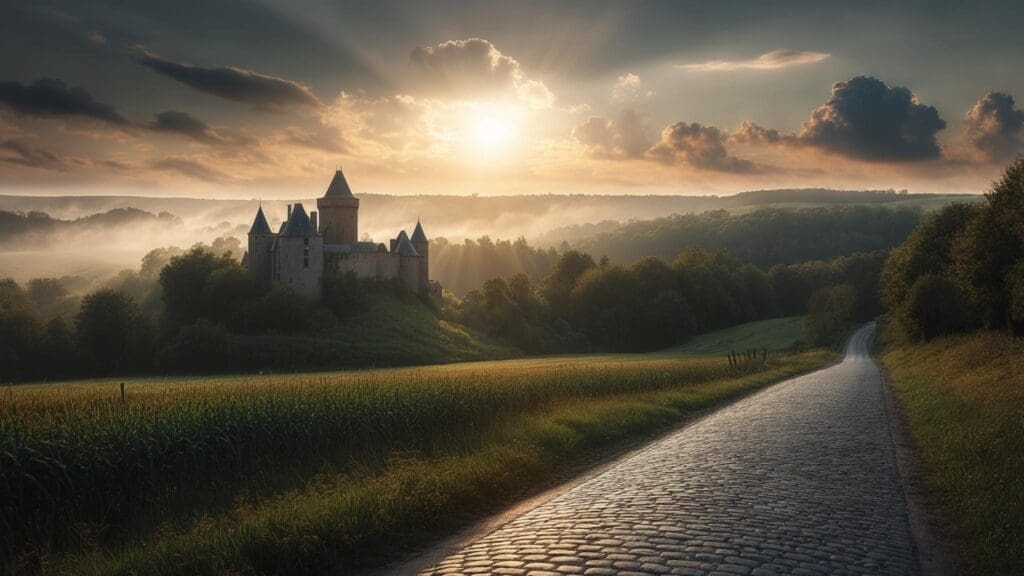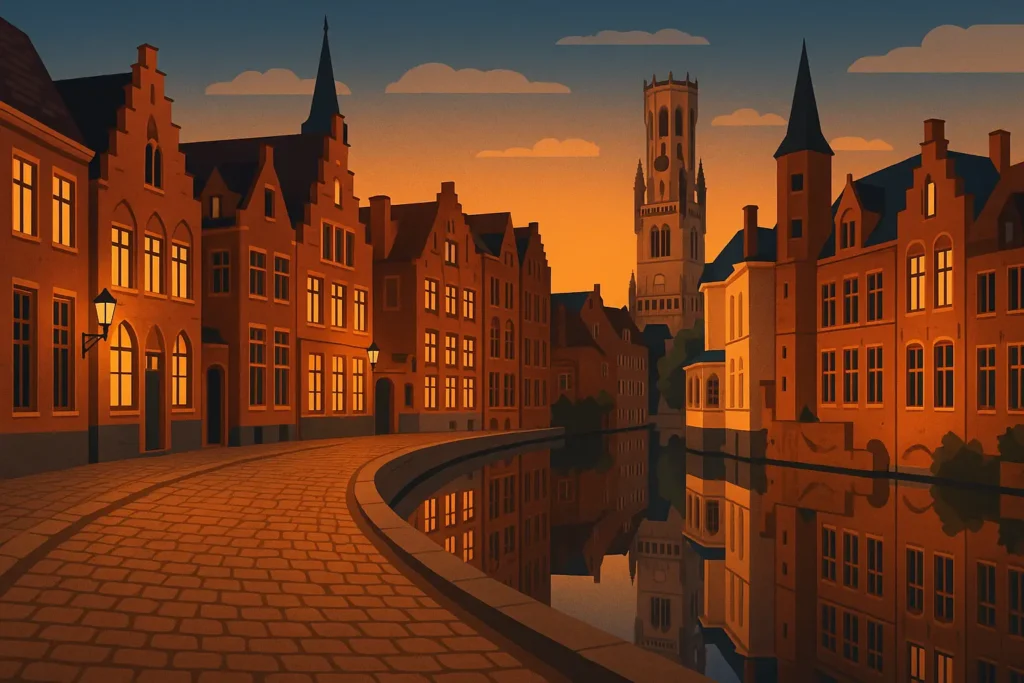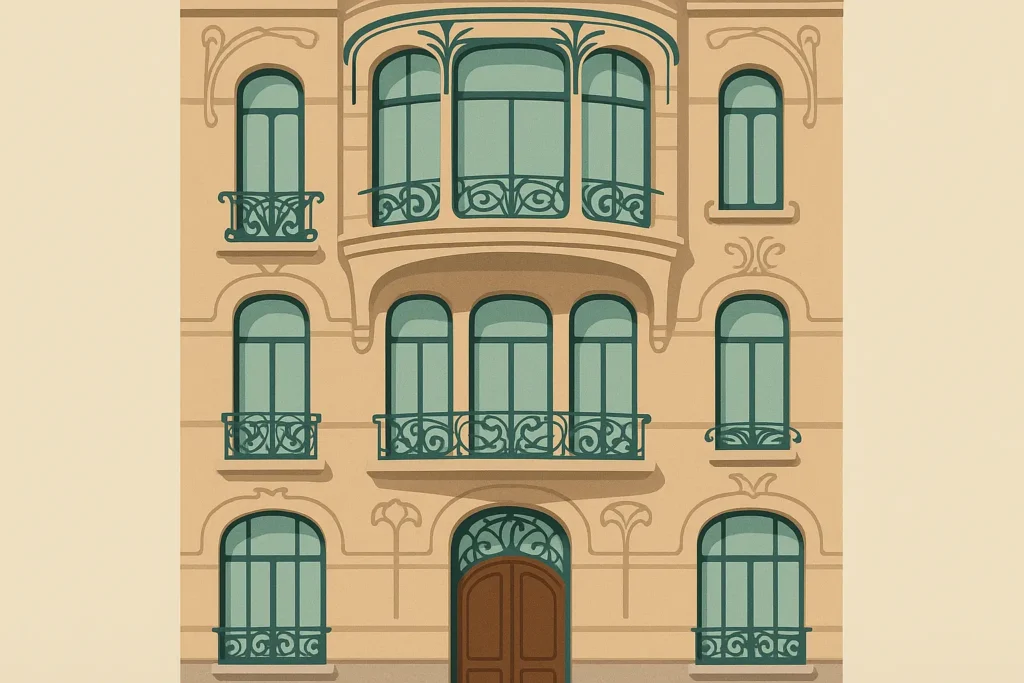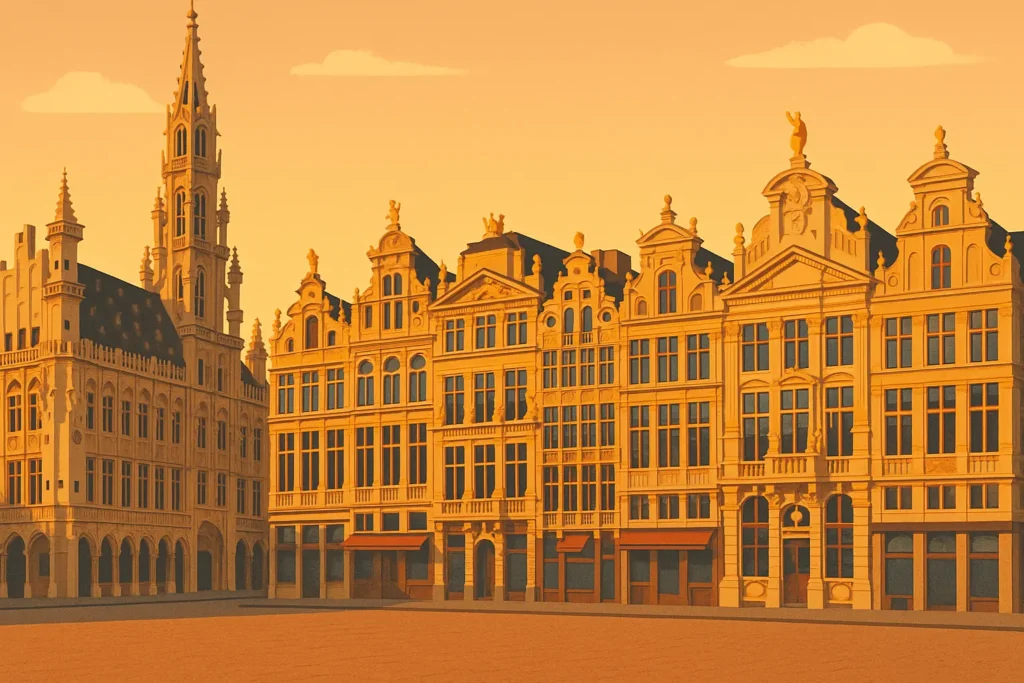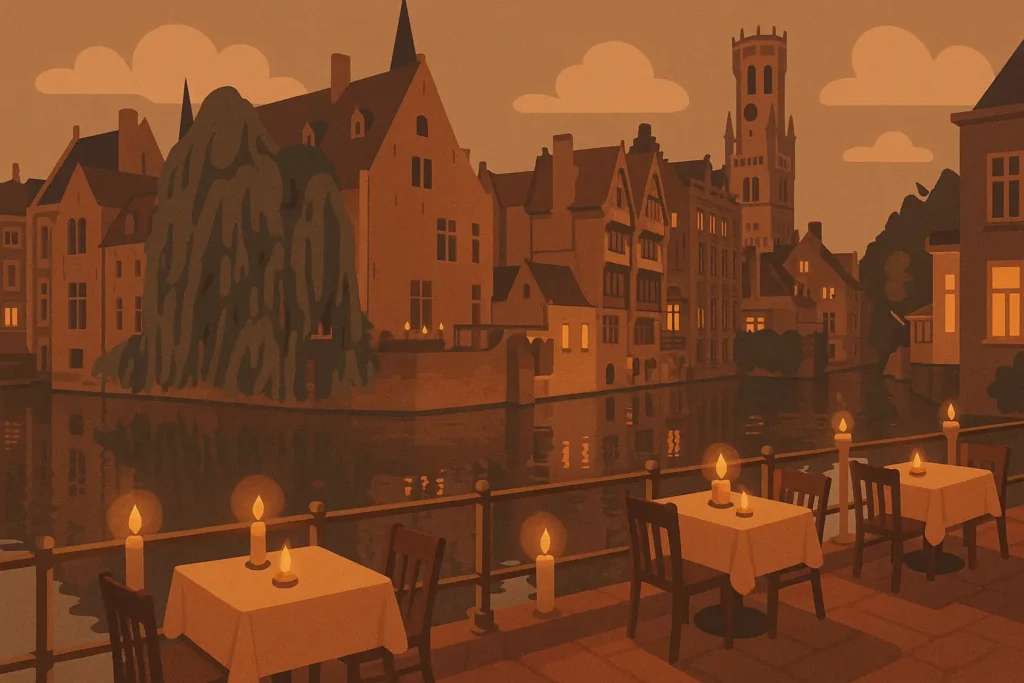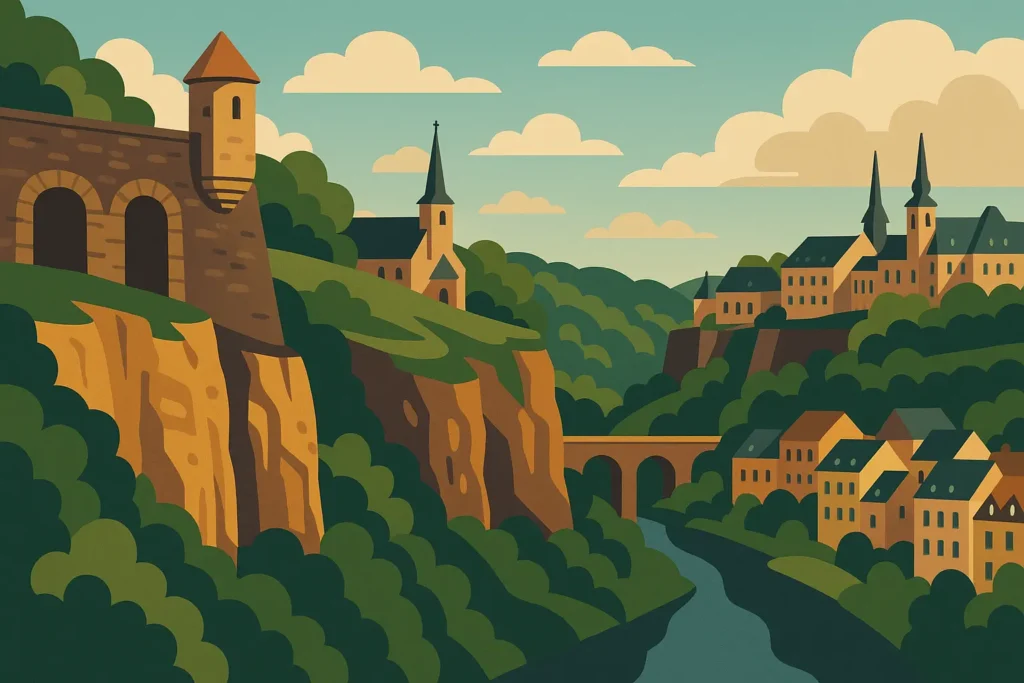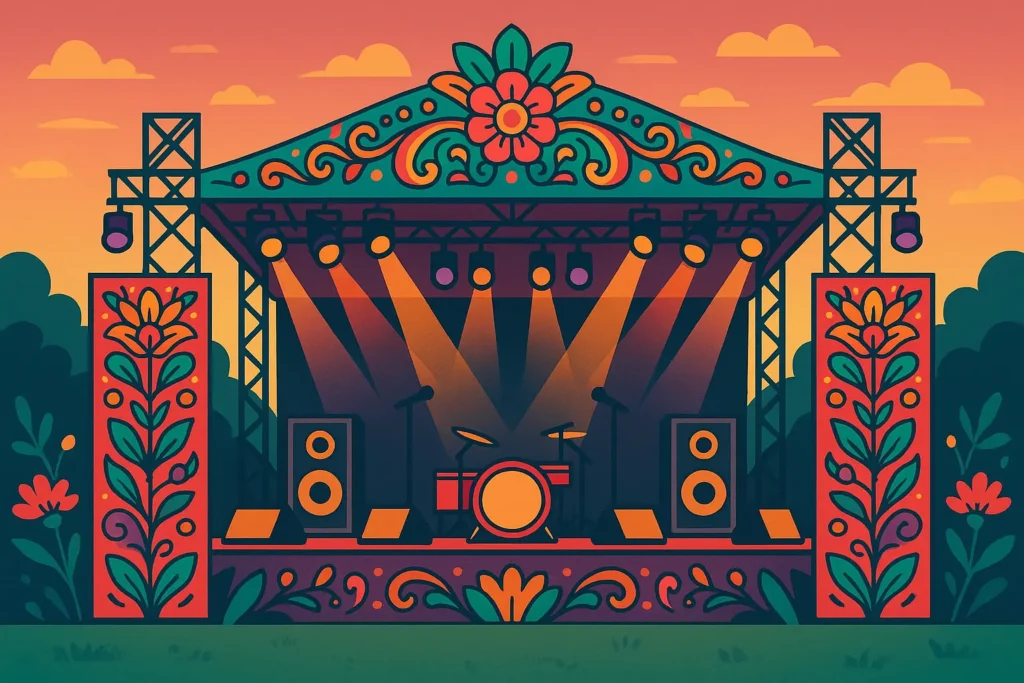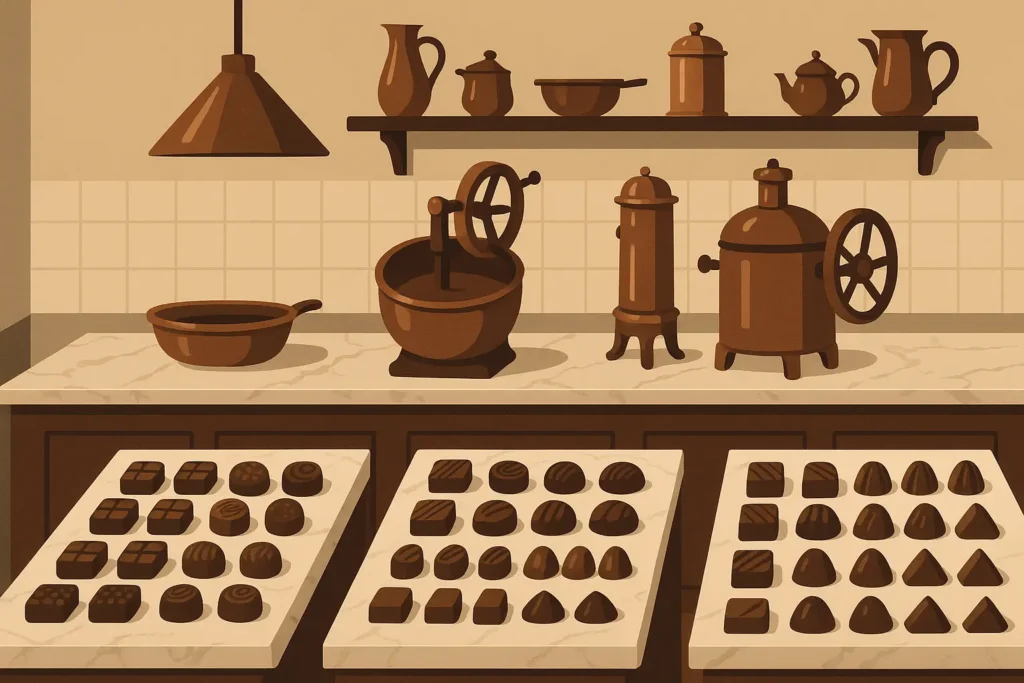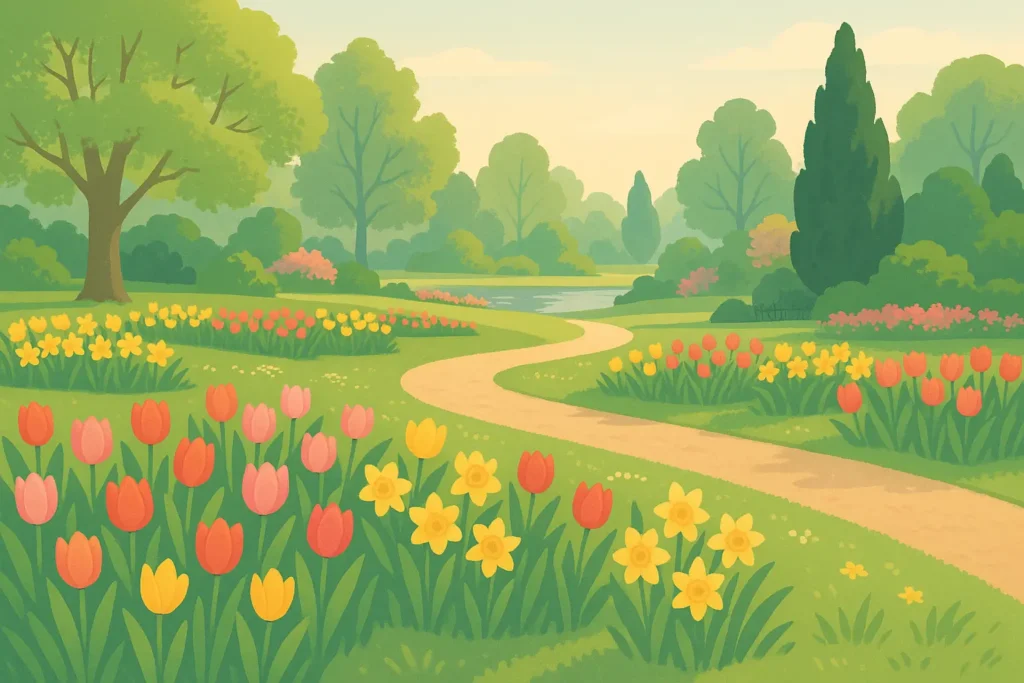I’ll be honest – I went to Belgium expecting to spend most of my time dodging crowds in Bruges. What I discovered instead was a country so perfectly compact and culturally rich that I ended up crafting 25 different ways to experience it. Belgium attracts over 8 million tourists annually to Bruges alone, making it one of Europe’s most concentrated travel destinations. I’ll never forget standing in Bruges’ main square at 2 PM on a Saturday, literally unable to move because of the crowd. That’s when I realized I needed to figure out a better way to see this incredible country.
That overwhelming moment sparked my deep dive into crafting diverse Belgium itineraries that work for every type of traveler. From quick weekend escapes to comprehensive cultural deep-dives, I’ve tested routes that make the most of Belgium’s tiny size while delivering genuine experiences, amazing food adventures, and historical discoveries that’ll stick with you.
Plan your ideal Belgium itinerary with our free Vacation Planner
Quick Resources:
TL;DR
Belgium’s tiny size makes it perfect for short trips (2-3 days) or longer European tours, with trains that actually run on time connecting all the major cities. Spring (April-May) and fall (September-October) give you the best weather and way fewer crowds than the summer madness.
Public transport is your friend for city-hopping, while renting a car opens up the countryside (though good luck finding parking in Bruges). Budget travelers can swing it for €50-80 per day, mid-range folks should expect €100-150, and if you’re going luxury, plan on €250+ including your hotel.
Each Belgium itinerary serves different travel styles: Quick Escapes for when you’re short on time, Extended Adventures when you want to really dig in, and Themed Experiences for when you’re obsessed with beer, chocolate, or medieval architecture. Belgium’s three regions (Flanders, Wallonia, Brussels) each have their own vibe worth exploring. The country absolutely nails culinary tourism – the chocolate, beer, and waffle experiences are legit and built into most of these itineraries.
Customize your Belgium trip style using our Vacation Planner
Planning Your Perfect Belgium Adventure
Before you pick your ideal Belgium itinerary, understanding a few key things will save you from my mistakes and help you actually enjoy your trip instead of stressing about logistics. Belgium’s small size is its superpower for both quick getaways and longer European adventures, but only if you match your chosen route to reality.
Use our Vacation Planner to align your trip with your real priorities
Here’s what I’ve learned after testing these routes: your transportation choice, when you go, and what actually interests you (not what Instagram says should interest you) determine which Belgium itinerary will give you the best time. The country’s small size creates amazing flexibility, but this only works when you’re honest about what you want to do in Belgium.
Duration and Timing Considerations
Belgium’s small size is both a blessing and a curse for trip planning. You can hit the highlights in 2 days if you’re in a rush, but you’ll be running around like a maniac. Longer stays let you actually breathe and discover those random little moments that make travel memorable.
Trip length matters more than anything else for your Belgium itinerary structure. Sure, you can experience the major highlights in just 2 days in Belgium, but you’ll sacrifice actually enjoying yourself for checking boxes. Extended trips of 4-7 days give you room to wander, discover that perfect little café, and not feel like you’re on a forced march.
Here’s the real deal on timing:
2-3 Days: Perfect for first-timers and weekend warriors. You’ll see the essentials and get a taste, but don’t expect to become a Belgium expert.
4-5 Days: The sweet spot. You can dig deeper, have flexible mornings, and won’t feel rushed every second.
6-7 Days: Now we’re talking. You can explore different regions, take spontaneous detours, and actually relax.
7+ Days: Either you’re doing a multi-country thing or you really, really love Belgium. Both are valid.
Seasonal timing affects everything – your experience and your wallet. Spring brings mild temps (10-15°C) and blooming gardens, perfect for walking around and sitting at outdoor cafés. Summer delivers festival season but also maximum crowds and prices that’ll make you wince.
Fall gives you comfortable weather and gorgeous Ardennes foliage, while winter has unique Christmas market magic. Event planning can totally transform your trip. Tomorrowland in July brings electronic music fans from everywhere, while December Christmas markets create that fairy-tale winter vibe.
Transportation Strategy Selection
Your transportation choice basically shapes your entire Belgium experience. Public transport gets you between major cities cheaply and efficiently, while renting a car gives you countryside freedom and the ability to explore multiple countries – but comes with headaches.
Public transportation rocks for city-to-city travel between Brussels, Bruges, Ghent, and Antwerp. The trains run frequently and you’re never more than 90 minutes from anywhere major. Rail passes save money if you’re doing multiple trips, and stations are usually walking distance from the historic centers.
My friend Sarah nailed the public transport thing – she bought a rail pass and hopped between Brussels, Ghent, and Bruges for three days, spending maybe €45 total on trains. Meanwhile, I rented a car thinking I’d be all independent, but ended up paying €25 just to park in Bruges for four hours. Learn from my mistake.
A Belgium road trip itinerary becomes worth it for countryside exploration and multi-country adventures. Cars get you to Ardennes villages, Luxembourg day trips, and random brewery stops. But city center parking is a nightmare and expensive, especially in Bruges and Brussels.
The best part about Belgium? Most city centers are totally walkable. Once you arrive somewhere, attractions cluster within compact historic areas, so you can maximize sightseeing time instead of figuring out transportation every five minutes.
See how your ideal pace fits with our Vacation Planner
Cultural Interest Alignment
Belgium’s got something for everyone – medieval architecture, world-class art, incredible food, and serious historical sites. The trick is being honest about what actually interests you versus what you think you should see.
Art and architecture lovers hit the jackpot in Belgium. Brussels has Art Nouveau masterpieces and the Magritte Museum, while Bruges preserves medieval architecture and Flemish paintings that’ll blow your mind.
Ghent combines Gothic cathedrals with cool contemporary art, and Antwerp showcases Rubens’ legacy alongside modern fashion culture. If you’re into food, Belgium transforms from just another sightseeing destination into a full-on gastronomic adventure. Chocolate factory tours, brewery experiences, and cooking classes give you hands-on cultural immersion that beats looking at stuff behind ropes.
History buffs will lose their minds here – from medieval guild halls to World War battlefields. Waterloo gives you Napoleonic history, while Ypres and Bastogne provide intense World War I and II context. EU headquarters in Brussels add contemporary political history.
The key to crafting your perfect Belgium itinerary? Be honest about what genuinely gets you excited versus what guidebooks say you should see.
Budget Planning Framework
Belgium works for pretty much any budget if you’re strategic about accommodation, food, and activities. There are clear cost levels that help you plan without breaking the bank or missing out on the good stuff.
Budget-friendly approaches focus on hostels (they’re actually clean and friendly in Belgium), local eateries, and free walking tours. Tons of museums have free admission days, and outdoor attractions cost nothing. Street food gives you authentic flavors without restaurant prices, while public transportation keeps daily costs reasonable.
If you’re watching your wallet, you can totally do Belgium on €50-60 a day – I’ve done it. Hostels run about €25-30, street food is legit (those frites!), and many museums have free days. Just don’t go crazy in the chocolate shops… easier said than done.
Mid-range experiences balance comfort with value through boutique hotels and quality restaurants. This budget level allows brewery tours, chocolate workshops, and guided experiences while keeping spending reasonable. Most travelers find this range gives you the best bang for your buck.
Luxury options emphasize premium accommodations, private tours, and exclusive experiences. Canal-side boutique hotels, Michelin-starred dining, and personal guides create memorable experiences for special occasions or when you’re prioritizing comfort over budget.
Group Dynamics Considerations
Different group types need totally different approaches. Solo travelers benefit from flexible schedules and chances to meet people, couples want romantic settings, families need kid-friendly stuff, and large groups require serious coordination.
Solo travel rocks in Belgium’s safe, English-friendly environment. Café culture gives you natural chances to meet people, while compact city centers eliminate navigation stress. You can be spontaneous and join group tours when you want company.
Traveling with a group in Belgium? Good luck getting everyone to agree on anything. My advice: pick one person to be the ‘decider’ for each day. Otherwise, you’ll spend two hours standing outside the chocolate museum debating whether to go in while that person who ‘doesn’t really like sweets’ holds everyone hostage.
Couple-oriented experiences emphasize Belgium’s romantic atmosphere through canal cruises, intimate dining, and charming accommodations. Horse-drawn carriage rides in Bruges, wine tastings in Brussels, and boutique hotel stays create memorable shared moments.
Family considerations include interactive museums, shorter walking distances, and stuff that’ll keep kids engaged. The Atomium, zoo visits, and hands-on chocolate workshops maintain kid interest while sneaking in education.
Planning your trip to Belgium gets way easier when you match your itinerary to your group’s actual dynamics and energy levels.
Quick Escapes (2-3 Days)
Quick escape itineraries make the most of Belgium’s tiny size to deliver the essential experiences when you’re short on time. These focus on the must-sees while keeping a realistic pace that won’t leave you exhausted and cranky.
These Belgium itinerary options work perfectly for weekend getaways, first-time visitors, or when you’re adding Belgium to a longer European tour. I’ve designed each route to show off the country’s highlights while respecting the reality that Belgium in 2 days means making smart choices, not trying to see everything.
1. Classic Brussels & Bruges Highlights
This foundational 2-day Belgium itinerary combines Belgium’s political capital with its most famous medieval city. It’s perfect for first-timers who want the essential cultural experiences, architectural eye candy, and food traditions that represent what Belgium’s all about.
Day one in Brussels centers on the UNESCO-listed Grand Place, where crazy ornate guildhalls create one of Europe’s most beautiful squares. Morning exploration includes the nearby Manneken Pis statue (yes, it’s tiny, no, it’s not disappointing) and Royal Museums of Fine Arts, while afternoon visits to the European Quarter provide contemporary context.
Evening dining in the Îlot Sacré district offers traditional Belgian cuisine in atmospheric surroundings. Day two transitions to Bruges via comfortable train connections, beginning with Market Square and the iconic Belfry Tower climb (yes, your legs will hurt, yes, it’s worth it). Canal boat tours provide unique city perspectives, while the chocolate museum delivers hands-on education.
Evening brewery visits introduce Belgium’s legendary beer culture through local tastings and traditional pub atmospheres. This Belgium itinerary works exceptionally well for weekend getaways, first-time visitors, and travelers with limited vacation time.
2. Art & Architecture Immersion
Designed for culture enthusiasts, this specialized 2-day itinerary focuses intensively on Belgium’s artistic heritage, from Art Nouveau masterpieces to medieval religious art. You’ll get deep cultural immersion rather than surface-level tourist experiences.
Brussels art exploration begins with the Magritte Museum, showcasing Belgium’s most famous surrealist artist through comprehensive collections and interactive exhibits. The Royal Museums complex provides broader context, while afternoon Art Nouveau walking tours reveal Victor Horta’s architectural innovations throughout the city.
Evening gallery visits in the Sablon district offer contemporary art perspectives. Ghent’s medieval marvels include Gravensteen Castle’s imposing architecture and St. Bavo’s Cathedral’s artistic treasures. The van Eyck brothers’ “Adoration of the Mystic Lamb” represents Flemish Primitive painting at its finest, while the Museum of Fine Arts provides broader context.
Art lovers find exceptional value in this concentrated Belgium itinerary approach, with world-class collections accessible within walking distances and expert curation that goes way beyond typical tourist experiences.
3. Beer & Chocolate Adventure
This culinary-focused weekend combines Belgium’s two most famous exports through hands-on experiences, factory tours, and expert tastings. Perfect for food and drink enthusiasts seeking authentic local experiences that you literally can’t get anywhere else.
Brussels brewery exploration starts with Cantillon’s traditional lambic production, where wild fermentation creates unique sour beer flavors. Delirium Café offers extensive Belgian beer selections in historic surroundings, while Pierre Marcolini chocolate workshops provide hands-on creation experiences with premium ingredients.
Pro tip from someone who learned the hard way: Belgian chocolate shops are like quicksand. I went in for ‘just one truffle’ and emerged an hour later with €40 worth of pralines and zero regrets.
My chocolate and beer weekend showcases perfect pairing strategies: Morning Cantillon brewery tour learning about wild fermentation (€12), afternoon Pierre Marcolini chocolate workshop creating personalized pralines (€45), evening at Delirium Café sampling 15 Belgian beers with expert guidance (€35). Total investment: €92 for world-class educational experiences impossible to replicate elsewhere.
Bruges continues the sweet theme through The Chocolate Line factory tours, revealing artisanal production methods and flavor innovations. De Halve Maan Brewery combines beer education with city history, while evening waffle-making classes teach traditional techniques using authentic recipes.
4. Romantic Couples Getaway
Crafted specifically for couples seeking intimate experiences, this romantic itinerary emphasizes Belgium’s fairy-tale atmosphere through private tours, candlelit dining, and charming accommodations that create memorable shared moments in ridiculously picturesque medieval settings.
Bruges romance begins with private canal tours avoiding tourist crowds, followed by horse-drawn carriage rides through cobblestone streets. Candlelit dinners overlooking medieval canals provide intimate atmospheres, while boutique accommodations enhance the romantic experience through personalized service and historic charm.
Ghent’s romantic appeal centers on couples photography sessions at the picturesque Graslei waterfront, where colorful guild houses reflect in calm waters. River cruises and castle visits provide shared adventures, while rooftop dining experiences offer panoramic city views and intimate conversation settings.
Couples find this Belgium itinerary creates lasting memories through carefully curated romantic experiences, avoiding crowded tourist activities while emphasizing Belgium’s most photogenic and intimate locations.
For couples planning their dream destination wedding in Belgium’s romantic settings, our destination wedding guide provides essential planning insights for creating magical celebrations.
Extended Adventures (4-7 Days)
Extended adventures give you comprehensive Belgium exploration through multi-city circuits, specialized themes, and deeper cultural immersion. You get to experience the country’s regional diversity while maintaining comfortable pacing and meaningful local connections.
These longer Belgium itinerary options work best for travelers with adequate vacation time who want to understand Belgium’s complexity beyond surface-level tourist stuff. I’ve structured each route to balance planned activities with spontaneous discovery opportunities – because sometimes the best travel moments are totally unplanned.
5. Complete Belgium Circuit
This comprehensive 7-day tour covers all major Belgian cities in logical geographic progression, giving you balanced exposure to political, cultural, and historical attractions while allowing sufficient time for both planned activities and spontaneous discoveries.
Start with a couple days in Brussels – yeah, it’s not the prettiest city, but hear me out. The EU stuff is actually cooler than it sounds (free tours!), the royal palace is gorgeous when it’s open, and the museums will blow your mind. Plus, the waffle game is strong. Art Nouveau architecture tours and traditional brewery visits provide cultural depth, while Grand Place evening illumination creates magical atmospheres.
Antwerp exploration (Day 3) reveals diamond district heritage, fashion culture, and Rubens’ artistic legacy. The stunning Centraal Station provides architectural highlights, while contemporary art museums balance historical attractions.
Ghent medieval immersion (Day 4) centers on Gravensteen Castle and St. Bavo’s Cathedral, with canal cruises providing unique city perspectives. University town atmosphere creates vibrant evening entertainment, while traditional restaurants offer authentic Flemish cuisine.
Look, Bruges in summer is a nightmare if you don’t Look, Bruges in summer is a nightmare if you don’t plan ahead. I showed up at 11 AM thinking I’d just wander around. Wrong. I couldn’t even see the famous towers through the sea of selfie sticks. But here’s the hack: get up early. Like, 7 AM early. The city is magical when it’s just you and the locals heading to work. Bruges UNESCO heritage (Day 5) delivers classic medieval experiences through Market Square, Belfry climbs, and canal boat tours. Chocolate workshops and lace-making demonstrations provide hands-on cultural education, while evening brewery visits complete the traditional experience.
Leuven university charm (Day 6) offers authentic Belgian student culture through historic campus tours and traditional pubs. The city’s compact size allows leisurely exploration, while proximity to Brussels provides convenient final-day logistics. Brussels conclusion (Day 7) allows final shopping, missed attractions, and departure preparations while reflecting on the comprehensive Belgian experience gained throughout the circuit.
This Belgium itinerary provides the most complete understanding of the country’s diversity and cultural complexity.
6. Belgium Road Trip Freedom
This self-drive itinerary maximizes flexibility and countryside access through strategic routing that connects major cities with scenic drives, hidden villages, and spontaneous stops impossible with public transportation. Perfect for independent travelers seeking adventure.
Brussels to Ghent (Day 1) begins with urban exploration before transitioning to medieval charm via scenic countryside routes. The one-hour drive allows morning Brussels activities and afternoon Ghent arrival, with evening canal-side dining.
Here’s what the drives actually look like:
Brussels → Ghent: 55km, 1 hour through Flemish countryside with Aalst market town stops
Ghent → Bruges: 45km, 45 minutes via medieval villages and Damme windmills
Bruges → Antwerp: 95km, 1.5 hours through polders landscape and Lissewege abbey
Antwerp → Hasselt: 85km, 1 hour via Kempen forests and Bokrijk heritage park
Hasselt → Dinant: 120km, 1.5 hours through Ardennes forests and Durbuy medieval charm
Ghent to Bruges (Day 2) provides short 45-minute transfers, maximizing sightseeing time in both cities. Flexible scheduling accommodates weather changes and personal interests, while car storage allows easy accommodation access.
Bruges to Antwerp (Day 3) extends driving time to 1.5 hours but reveals Flemish countryside landscapes. Antwerp’s fashion district and diamond quarter provide urban contrasts to medieval experiences, while evening brewery visits celebrate regional specialties.
Antwerp to Hasselt (Day 4) explores lesser-known Belgian regions through jenever distilleries and local markets. The one-hour drive maintains comfortable pacing while introducing authentic local culture beyond tourist destinations.
Hasselt to Dinant (Day 5) ventures into Wallonia’s French-speaking region via scenic Ardennes routes. The 1.5-hour drive reveals countryside beauty, while Dinant’s saxophone heritage and riverside charm provide cultural variety. Dinant to Brussels (Day 6) completes the circuit through final countryside views and convenient departure logistics.
This Belgium road trip itinerary delivers maximum independence and access to hidden gems throughout the country. Your trip to Belgium becomes infinitely more flexible when you control your own transportation schedule.
7. Historical Belgium Deep Dive
This specialized itinerary focuses intensively on Belgium’s rich historical heritage, from medieval origins through World Wars to European Union formation. You’ll get educational depth and emotional connection to significant historical events and locations.
Brussels historical foundation (Days 1-2) establishes medieval origins through guild house architecture and royal palace tours. European Union headquarters provide contemporary political context, while world-class museums offer comprehensive historical education through artifacts and interactive exhibits.
Waterloo battlefield (Day 3) delivers Napoleonic history through guided tours, museum visits, and battlefield walks. The site’s significance in European history becomes tangible through expert interpretation and preserved landscapes that witnessed decisive historical moments.
Ypres World War I immersion (Day 4) provides emotional connection to Great War history through preserved battlefields, memorial sites, and the moving Last Post ceremony. Flanders Fields Museum offers comprehensive context, while cemetery visits honor fallen soldiers.
Bastogne World War II education (Day 5) focuses on Battle of the Bulge history through interactive museums and preserved battle sites. American military heritage combines with local resistance stories, creating comprehensive understanding of wartime experiences.
Tournai medieval heritage (Day 6) reveals Belgium’s oldest city through Romanesque cathedral architecture and ancient fortifications. The city’s strategic importance throughout history becomes evident through guided tours and museum collections.
History enthusiasts find exceptional value in this concentrated Belgium itinerary approach, gaining deep understanding of Belgium’s role in European development while experiencing emotional connections to significant historical events.
8. Culinary Belgium Journey
This gastronomic adventure explores Belgium’s diverse culinary landscape through regional specialties, cooking classes, and expert-guided tastings that reveal the cultural significance of food and drink in Belgian society while providing hands-on learning experiences.
Brussels Michelin excellence (Day 1) introduces haute cuisine through starred restaurants and innovative chefs. Market tours reveal ingredient selection, while cooking classes teach professional techniques using traditional recipes and modern interpretations.
Bruges traditional Flemish cooking (Day 2) focuses on regional specialties through hands-on workshops and family-run restaurants. Local markets provide ingredient education, while traditional cooking methods reveal cultural heritage through authentic preparation techniques and family recipes passed down through generations.
Ghent food market exploration (Day 3) showcases local producers through guided tastings and vendor interactions. Vegetarian capital status provides plant-based innovation, while traditional beer pairings demonstrate culinary harmony between food and drink traditions.
Antwerp modern Belgian cuisine (Day 4) reveals contemporary culinary evolution through innovative restaurants and fusion concepts. Fashion district dining reflects the city’s creative culture, while traditional markets maintain authentic local connections.
Hasselt jenever distilleries (Day 5) introduce Belgium’s national spirit through production tours and expert tastings. Traditional distillation methods contrast with modern innovations, while food pairings demonstrate regional culinary integration.
Food enthusiasts gain comprehensive understanding of Belgian cuisine evolution while developing practical cooking skills and cultural appreciation through immersive experiences beyond typical restaurant dining. This Belgium itinerary transforms eating from necessity into cultural education.
9. Art Lover’s Belgium
This specialized cultural itinerary provides intensive exposure to Belgium’s artistic heritage through world-class museums, historic studios, and contemporary galleries. Art enthusiasts get comprehensive understanding of Belgian contributions to European artistic development.
Brussels artistic foundation (Days 1-2) combines Magritte’s surrealist legacy with Royal Museums’ comprehensive collections. Art Nouveau architecture tours reveal Horta’s innovations, while contemporary galleries showcase modern Belgian artistic expression and international influences.
Antwerp Rubens heritage (Day 3) explores the master’s house-studio and cathedral paintings. Contemporary art museums provide modern context, while diamond district craftsmanship demonstrates artistic skill in different mediums and cultural applications.
Ghent van Eyck mastery (Day 4) centers on “Adoration of the Mystic Lamb” and medieval artistic techniques. University art collections provide broader context, while contemporary installations demonstrate artistic evolution and cultural continuity.
Bruges Groeningemuseum (Day 5) showcases Flemish Primitive masterpieces and Memling’s religious art. The preserved medieval setting enhances artistic appreciation, while local workshops demonstrate traditional techniques still practiced today.
Art lovers appreciate this concentrated Belgium itinerary approach, gaining deep understanding of Belgian artistic contributions while experiencing masterpieces in their original cultural contexts and geographic settings.
Regional Combinations
Regional combination itineraries leverage Belgium’s central European location to create multi-country experiences, explore distinct linguistic and cultural regions within Belgium, and provide comprehensive understanding of the country’s diverse heritage through focused geographic exploration.
These Belgium itinerary variations work particularly well for travelers interested in cultural comparisons or those seeking to maximize their European vacation through strategic geographic positioning.
10. Belgium and Luxembourg Adventure
This cross-border itinerary combines two small European nations for comprehensive Benelux exploration, utilizing Belgium’s central location to access Luxembourg’s unique culture while maintaining efficient logistics and diverse experiences across both countries.
Brussels foundation (Days 1-2) provides Belgian cultural context through major attractions and culinary experiences. European Union headquarters create political connections to Luxembourg’s EU role, while traditional experiences establish baseline for cultural comparisons.
Luxembourg City UNESCO exploration (Day 3) reveals the Grand Duchy’s unique identity through Old Quarter walks and fortress tours. Banking district modernity contrasts with medieval preservation, while multilingual culture demonstrates European integration.
Vianden castle countryside (Day 4) showcases Luxembourg’s natural beauty through hilltop fortress visits and river valley exploration. Traditional villages provide authentic local culture, while scenic drives reveal countryside landscapes impossible to experience in urban Belgium.
Echternach nature immersion (Day 5) combines historical significance with outdoor activities through abbey visits and nature park exploration. The contrast with Belgium’s urban density provides perspective on regional diversity within small European nations.
Bastogne return journey (Day 6) connects Luxembourg experiences with Belgian World War II history, creating thematic continuity while providing convenient Brussels return logistics and final cultural synthesis.
This Belgium and Luxembourg itinerary maximizes small-country exploration while maintaining manageable travel distances and cultural coherence.
11. Flanders Region Deep Dive
This Dutch-speaking Belgium exploration provides comprehensive understanding of Flemish culture, medieval heritage, and contemporary life through major cities and hidden gems that showcase the region’s distinct identity within Belgian diversity.
Antwerp cultural capital (Days 1-2) establishes Flemish artistic heritage through Rubens legacy and contemporary fashion culture. Diamond district history reveals international trade connections, while local breweries maintain traditional culture alongside modern innovation.
Ghent medieval preservation (Day 3) demonstrates Flemish architectural mastery through castle visits and cathedral tours. University culture provides contemporary context, while canal-side dining maintains traditional atmospheric experiences.
Bruges tourism balance (Day 4) addresses the challenge of experiencing authentic culture within heavily touristed environments. Early morning and evening exploration avoids crowds, while local guide insights reveal hidden aspects beyond typical tourist experiences.
Leuven university authenticity (Day 5) provides genuine Flemish student culture through campus tours and traditional pubs. The city’s academic atmosphere contrasts with tourist-focused destinations while maintaining cultural authenticity and local connections.
Mechelen hidden gem discovery (Day 6) reveals lesser-known Flemish charm through uncrowded exploration and authentic local interactions. Traditional markets and family-run establishments provide genuine cultural experiences without tourist commercialization.
This Belgium itinerary delivers authentic Flemish cultural immersion while avoiding the overwhelming tourist pressure found in more famous destinations.
12. Wallonia French Heritage
This French-speaking southern Belgium exploration reveals distinct cultural identity through countryside landscapes, industrial heritage, and unique traditions that contrast significantly with northern Flemish regions while maintaining authentic Belgian character.
Liège cultural capital (Day 1) introduces Walloon identity through industrial heritage and contemporary culture. The city’s working-class character contrasts with tourist-focused destinations, while traditional cuisine reflects French influences within Belgian traditions.
My Wallonia discovery revealed authentic French-Belgian culture: Morning Liège market exploration sampling boudin blanc and local cheeses (€15), afternoon Curtius Museum visit learning regional history (€8), evening traditional restaurant dinner featuring carbonnade flamande with regional Jupiler beer (€35). Total cultural immersion cost: €58 for genuine local experiences unavailable in tourist areas.
Dinant saxophone birthplace (Day 2) combines musical heritage with scenic Meuse River landscapes. Adolphe Sax’s legacy provides cultural focus, while riverside charm and local specialties create memorable experiences beyond typical tourist activities.
Namur citadel exploration (Day 3) reveals strategic military importance through hilltop fortress tours and river confluence geography. Cable car rides provide unique perspectives, while traditional restaurants maintain authentic regional cuisine and local atmosphere.
Spa original wellness (Day 4) explores the town that gave its name to spa culture worldwide. Thermal spring heritage combines with contemporary wellness experiences, while countryside setting provides relaxation and natural beauty.
Durbuy smallest city charm (Day 5) delivers concentrated medieval atmosphere in Europe’s smallest city designation. Stone architecture and riverside setting create intimate experiences, while local crafts and cuisine maintain authentic cultural connections.
This Belgium itinerary showcases the country’s French-speaking region while providing cultural experiences dramatically different from northern Belgium.
13. Tri-Country European Experience
This ambitious cross-border adventure maximizes Belgium’s central European location to experience three distinct national cultures within a single journey, providing comparative cultural education and efficient multi-country touring through strategic geographic planning.
Brussels Belgian foundation (Days 1-2) establishes cultural baseline through comprehensive city exploration and traditional experiences. European Union context provides political connections to neighboring countries, while culinary traditions create comparison points for upcoming cultural encounters.
Maastricht Dutch contrast (Day 3) reveals Netherlands culture through 45-minute drive convenience. The historic city provides distinct architectural styles and cultural traditions, while proximity maintains efficient logistics and prevents travel fatigue.
Luxembourg City independence (Day 4) showcases small nation sovereignty through unique political and cultural identity. Banking importance and multilingual society demonstrate European integration, while fortress heritage provides historical context.
Ardennes return journey (Day 5) utilizes scenic countryside routes for cultural synthesis and reflection. The forested region provides natural beauty contrast to urban experiences, while Belgian return creates journey completion and departure logistics.
This Belgium itinerary demonstrates how the country’s central location enables efficient multi-country exploration within a single vacation.
Theme
Themed Experiences
Themed experience itineraries focus on specific interests and seasonal opportunities, allowing travelers to pursue passionate interests while experiencing Belgium’s cultural offerings through specialized lenses that provide deeper understanding and memorable experiences.
These specialized Belgium itinerary options work best for travelers with clear interests who prefer depth over breadth in their cultural exploration.
14. Festival Belgium Circuit
This summer-focused itinerary aligns travel timing with Belgium’s major festival season, providing access to world-renowned music events and cultural celebrations that showcase contemporary Belgian culture alongside traditional heritage experiences.
Tomorrowland electronic music (July) attracts global audiences to Belgium’s most famous festival. The Boom location provides unique cultural immersion, while festival camping or Brussels accommodation offers different experience levels and budget options.
Gentse Feesten cultural celebration (July) transforms Ghent into Europe’s largest cultural festival. Street performances, local music, and traditional food create authentic cultural experiences, while historic setting enhances atmospheric appeal.
Brussels Summer Festival (August) provides capital city entertainment through diverse musical programming. Urban festival setting allows cultural exploration between performances, while accommodation variety accommodates different budget levels and preferences.
Rock Werchter international music (July) delivers major international acts in intimate Belgian setting. The festival’s reputation attracts music lovers worldwide, while proximity to Brussels provides convenient logistics and cultural exploration opportunities.
This Belgium itinerary transforms your visit into a music-focused cultural adventure that showcases contemporary Belgian creativity alongside traditional heritage.
15. Christmas Markets Magic
This winter specialty itinerary capitalizes on Belgium’s exceptional Christmas market traditions, creating magical holiday experiences through traditional crafts, seasonal foods, and festive atmospheres that transform historic city centers into winter wonderlands.
Brussels Grand Place Christmas Market creates stunning backdrop through historic architecture and festive lighting. Traditional crafts and seasonal foods provide authentic experiences, while central location allows easy exploration of multiple market areas.
Bruges Winter Glow transforms medieval streets through artistic light installations and traditional market stalls. The intimate city scale creates cozy atmosphere, while canal reflections enhance magical winter ambiance and photographic opportunities.
Ghent Winter Festival combines Christmas traditions with contemporary cultural programming. University town energy maintains vibrant atmosphere, while historic setting provides traditional market experiences and seasonal dining opportunities.
Liège Christmas Village provides authentic Walloon holiday traditions through regional specialties and local crafts. The industrial city’s transformation demonstrates Christmas magic’s universal appeal, while French influences create distinct cultural experiences.
This Belgium itinerary delivers winter magic that transforms familiar destinations into enchanted seasonal experiences.
16. Beer Pilgrimage Journey
This specialized brewing tour explores Belgium’s legendary beer culture through monastery visits, traditional breweries, and expert tastings that reveal the cultural significance and production artistry behind the country’s most famous export.
Brussels brewing diversity (Day 1) introduces lambic traditions through Cantillon visits and Delirium Café experiences. Traditional brewing methods contrast with contemporary innovations, while expert guidance provides cultural context and tasting education.
Leuven Stella Artois heritage (Day 2) explores industrial brewing history through factory tours and brand development stories. The university town setting provides cultural context, while traditional pubs maintain authentic drinking culture alongside commercial success.
Bruges De Halve Maan tradition (Day 3) combines brewery tours with medieval city exploration. Traditional brewing methods within historic settings create authentic experiences, while beer pipeline innovation demonstrates cultural adaptation and modern efficiency.
Antwerp De Koninck local pride (Day 4) showcases regional brewing identity through city brewery tours and local pub culture. The “Bolleke” tradition demonstrates community connection, while interactive experiences provide hands-on brewing education.
Chimay Trappist monastery (Day 5) delivers authentic monastic brewing through abbey visits and traditional production methods. Religious heritage provides cultural depth, while countryside setting creates peaceful conclusion to intensive beer education journey.
This Belgium itinerary transforms beer appreciation from casual drinking into deep cultural education and spiritual experience.
17. Chocolate Trail Indulgence
This sweet-focused journey explores Belgium’s chocolate mastery through artisanal workshops, factory tours, and expert tastings that reveal production techniques, flavor innovations, and cultural significance of the country’s most beloved culinary export.
Brussels chocolate origins (Day 1) trace Godiva and Leonidas founding stories through historic locations and modern production facilities. Traditional techniques contrast with contemporary innovations, while expert tastings develop palate appreciation and cultural understanding.
Bruges artisanal excellence (Day 2) focuses on small-batch producers and traditional methods through workshop participation and master chocolatier meetings. Medieval setting enhances romantic appeal, while hands-on experiences create lasting memories and practical skills.
Antwerp chocolate innovation (Day 3) explores contemporary techniques and flavor experimentation through modern workshops and creative studios. Fashion district location reflects creative culture, while traditional markets maintain authentic local connections.
Ghent local chocolate makers (Day 4) discover hidden gems and family businesses through guided tours and personal interactions. University town atmosphere provides cultural context, while traditional recipes demonstrate regional variations and family heritage.
This Belgium itinerary satisfies sweet cravings while providing comprehensive education in chocolate craftsmanship and cultural significance.
18. Architecture Enthusiast Tour
This specialized cultural journey focuses intensively on Belgium’s architectural heritage, from medieval Gothic masterpieces through Art Nouveau innovations to contemporary European Union buildings, providing comprehensive understanding of architectural evolution and cultural expression.
Brussels architectural diversity (Days 1-2) spans Art Nouveau masterpieces through Horta house tours and Gothic cathedral visits. European Union buildings demonstrate contemporary architecture, while Grand Place provides medieval guild house preservation and UNESCO recognition.
Antwerp cathedral magnificence (Day 3) showcases Gothic architecture through Our Lady Cathedral tours and guild house exploration. Modern port architecture provides contemporary contrast, while diamond district buildings reflect international trade prosperity and cultural adaptation.
Ghent medieval preservation (Day 4) demonstrates Gothic perfection through Gravensteen Castle and St. Bavo’s Cathedral exploration. Medieval guildhalls provide commercial architecture examples, while university buildings show educational institution development and cultural continuity.
Bruges Gothic consistency (Day 5) reveals comprehensive medieval preservation through Market Square and Belfry architecture. The UNESCO designation demonstrates international recognition, while residential architecture shows daily life integration within historic preservation requirements.
This Belgium itinerary delivers architectural education that spans centuries of building innovation and cultural expression.
Special Interest Groups
Special interest group itineraries address specific traveler demographics and budget levels, providing tailored experiences that accommodate unique needs, preferences, and constraints while maintaining authentic Belgian cultural experiences and practical logistics.
These targeted Belgium itinerary designs recognize that different travelers require different approaches to maximize their satisfaction and cultural engagement.
19. Family-Friendly Belgium Adventure
This child-focused itinerary balances educational experiences with entertainment value, ensuring engaging activities for various age groups while maintaining cultural authenticity and practical logistics that accommodate family travel constraints and energy levels.
Brussels family exploration (Day 1) centers on Atomium visits and Comic Strip Museum tours that engage children while providing cultural education. Interactive exhibits maintain attention spans, while nearby parks provide energy release and picnic opportunities.
Bruges fairy-tale experience (Day 2) utilizes horse carriages and boat tours that appeal to children’s imagination while showcasing medieval architecture. Chocolate workshops provide hands-on activities, while compact city size prevents walking fatigue.
Antwerp zoo excellence (Day 3) combines animal experiences with hands-on museums that encourage learning through play. The historic zoo setting provides cultural context, while nearby attractions offer backup activities for weather contingencies.
Ghent castle exploration (Day 4) engages children through medieval history and interactive exhibits. Gravensteen’s fortress atmosphere sparks imagination, while canal cruises provide rest periods and different perspectives on city exploration.
Walibi Belgium theme park (Day 5) delivers pure entertainment through rides and attractions designed for various age groups. The dedicated fun day balances cultural education with vacation enjoyment, while proximity to Brussels maintains convenient logistics.
This Belgium itinerary proves that family travel can combine education with entertainment while keeping everyone engaged and happy.
20. Luxury Belgium Indulgence
This premium experience itinerary emphasizes high-end accommodations, exclusive access, and personalized services that create memorable luxury travel through Belgium’s finest offerings while maintaining cultural authenticity and sophisticated experiences.
Brussels luxury foundation (Days 1-2) features Hotel des Galeries accommodation and Michelin-starred dining experiences. Private tours provide exclusive access, while premium shopping districts offer luxury goods and personalized service within historic settings.
Bruges boutique romance (Days 3-4) showcases canal-side luxury hotels and intimate dining experiences. Private boat tours avoid crowds, while exclusive chocolate workshops provide personalized instruction and premium ingredient access.
Antwerp fashion luxury (Day 5) explores high-end shopping districts and designer boutiques through personal shopping services. Fashion museum private tours provide cultural context, while luxury accommodations reflect the city’s creative sophistication.
Spa wellness conclusion (Day 6) delivers authentic spa town experiences through premium thermal treatments and luxury wellness facilities. The original spa location provides historical context, while contemporary luxury maintains comfort and relaxation standards.
This Belgium itinerary demonstrates that luxury travel can enhance rather than diminish authentic cultural experiences.
21. Budget Belgium Maximization
This cost-conscious itinerary demonstrates that authentic Belgian experiences remain accessible through strategic choices in accommodation, dining, and activities, proving that budget constraints don’t require sacrificing cultural depth or memorable experiences.
Brussels budget exploration (Days 1-2) utilizes free walking tours and affordable hostel accommodation while accessing major attractions. Many museums offer free admission days, while local markets provide authentic food experiences at reasonable prices.
Ghent student-friendly pricing (Day 3) takes advantage of university town economics through affordable dining and accommodation options. Student discounts apply to many attractions, while vibrant nightlife provides entertainment value without premium costs.
Bruges self-guided discovery (Day 4) avoids expensive tours through independent exploration and free outdoor attractions. Early morning and evening visits provide crowd-free experiences, while picnic lunches reduce dining costs without sacrificing quality.
Antwerp free museum days (Day 5) coordinate visits with complimentary admission schedules while utilizing budget accommodation and local dining. Walking tours provide cultural context, while public transportation maintains affordable logistics throughout the experience.
This Belgium itinerary proves that memorable cultural experiences don’t require expensive budgets when you plan strategically.
22. Solo Traveler’s Belgium
This independent travel itinerary addresses solo traveler needs through safe navigation, social opportunities, and flexible scheduling that accommodates personal interests while providing security and cultural connection opportunities throughout the journey.
Brussels solo foundation (Days 1-2) utilizes group tours for social interaction and café culture for relaxed exploration. The capital’s international atmosphere provides English-language comfort, while diverse neighborhoods offer varied experiences and personal discovery opportunities.
Bruges photography focus (Day 3) provides structured activity through self-guided photo walks and scenic location discovery. The compact city size ensures safety, while early morning exploration offers crowd-free photography and peaceful personal reflection.
Ghent university social scene (Day 4) leverages student town atmosphere for natural social interaction through pub culture and cultural events. The vibrant nightlife provides entertainment options, while academic atmosphere creates intellectual stimulation and cultural exchange.
Antwerp fashion districts (Day 5) offer structured exploration through shopping areas and art districts that provide safe solo navigation. Gallery visits and museum tours create cultural engagement, while café culture provides social interaction opportunities and local connections.
This Belgium itinerary empowers solo travelers to explore confidently while creating opportunities for meaningful cultural connections.
Seasonal Specialties
Seasonal specialty itineraries optimize timing to capture Belgium’s unique seasonal offerings, from spring garden blooms through summer festival seasons to autumn countryside colors and winter market magic, ensuring travelers experience the country at its most appealing moments.
These timing-specific Belgium itinerary options help you experience the country when natural and cultural conditions align for optimal experiences.
23. Spring Belgium Awakening
This spring-focused itinerary capitalizes on mild weather, blooming gardens, and reduced crowds to provide optimal sightseeing conditions while showcasing Belgium’s natural beauty and outdoor café culture during the country’s most pleasant season.
Brussels spring emergence (Day 1) includes Keukenhof day trip possibilities and urban garden exploration. Mild temperatures encourage walking tours, while outdoor café season begins providing authentic local lifestyle experiences and cultural immersion opportunities.
Ghent flower markets (Day 2) showcase seasonal blooms and garden culture through local markets and botanical displays. University town atmosphere provides vibrant energy, while canal-side gardens create photogenic spring scenes and peaceful exploration opportunities.
Bruges Begijnhof blooms (Day 3) feature spring flowers in the historic courtyard setting, creating magical photographic opportunities. Reduced tourist crowds allow authentic experiences, while mild weather encourages extended outdoor exploration and canal-side dining.
Antwerp outdoor season (Day 4) marks the beginning of terrace culture and outdoor dining experiences. Fashion district exploration benefits from comfortable walking weather, while spring festivals and cultural events provide seasonal entertainment and local cultural immersion.
This Belgium itinerary captures the country’s most beautiful season while avoiding peak tourist pressures.
24. Summer Belgium Festival Peak
This peak season itinerary maximizes summer’s extended daylight, festival programming, and outdoor activities while managing higher crowds and prices through strategic timing and advance planning that ensures access to Belgium’s most popular seasonal experiences.
Brussels summer terraces (Days 1-2) feature outdoor concert venues and extended café culture through long daylight hours. Summer festivals provide entertainment variety, while tourist season energy creates vibrant atmosphere despite increased crowds and higher accommodation costs.
Ghent festival season (Day 3) coincides with major cultural celebrations and street performance programming. The city transforms during summer festivals, while extended daylight allows comprehensive exploration and late-evening cultural activities.
Bruges extended sightseeing (Day 4) utilizes long summer days for comprehensive exploration despite peak tourist crowds. Early morning and late evening visits provide better experiences, while summer weather ensures reliable outdoor activity conditions.
Ostend beach day (Day 5) provides coastal relief from urban exploration through Belgium’s premier seaside resort. Beach culture offers different cultural perspectives, while seafood dining and coastal walks create memorable summer experiences and relaxation opportunities.
This Belgium itinerary maximizes summer’s advantages while managing the challenges of peak season travel.
25. Autumn Belgium Colors
This fall-focused itinerary captures Belgium’s most photogenic season through Ardennes foliage, comfortable walking weather, and harvest season celebrations while avoiding summer crowds and benefiting from moderate prices and ideal sightseeing conditions.
Brussels autumn comfort (Day 1) features cozy café culture and comfortable museum exploration during the season’s mild temperatures. Fewer crowds improve attraction experiences, while harvest season dining showcases seasonal ingredients and traditional preparation methods.
Ardennes foliage expedition (Day 2) reveals countryside beauty through scenic drives and forest walks during peak autumn colors. The region’s natural beauty contrasts with urban experiences, while harvest festivals celebrate seasonal traditions and local culture.
Bruges romantic atmosphere (Day 3) benefits from autumn’s golden light and reduced tourist pressure. The medieval setting gains atmospheric enhancement from seasonal weather, while comfortable temperatures encourage extended exploration and intimate dining experiences.
Ghent comfortable exploration (Day 4) utilizes ideal walking weather for comprehensive city discovery. University town energy returns with academic year beginning, while autumn festivals and cultural programming provide entertainment and local cultural engagement opportunities.
This Belgium itinerary showcases the country during its most photogenic and comfortable season.
How Each It
How Each Itinerary Performs Against Key Travel Factors
This comprehensive analysis evaluates all 25 itineraries across essential planning considerations, providing objective performance assessments that help travelers select optimal experiences based on their specific priorities, constraints, and preferences while understanding trade-offs and realistic expectations.
Understanding how each Belgium itinerary performs against practical factors helps you make informed decisions rather than choosing based on wishful thinking or unrealistic expectations.
Duration and Transportation Analysis
Different itinerary lengths and transportation choices create distinct advantages and limitations, with shorter trips maximizing efficiency while longer journeys allow deeper exploration, and transportation selection fundamentally affecting accessibility, costs, and experience quality throughout your Belgian adventure.
Quick escape itineraries (1-4) excel for weekend trips and first-time visitors through efficient highlight coverage and manageable logistics. Time constraints limit depth but ensure essential experience delivery, making them perfect for busy professionals or European tour additions with limited Belgium allocation.
Extended adventures (5-9) provide comprehensive coverage and flexible pacing that allows spontaneous discoveries and cultural immersion. Better cost-per-day ratios emerge through longer stays, while deeper exploration creates more meaningful local connections and authentic cultural understanding.
Regional combinations (10-13) maximize Belgium’s central European location for multi-country experiences but require more complex planning and potentially higher transportation costs. These work best for experienced European travelers with longer vacation allocations and multi-destination interests.
Here’s the real deal on transportation:
Public Transport works best for itineraries 1-4, 8-9, 19, 21-22. You’ll spend €30-60/day with medium flexibility but only access major cities.
Car Rental suits itineraries 6, 10, 13, 23-25. Expect €60-100/day with high flexibility and full countryside access.
Mixed Transport optimizes itineraries 5, 7, 11-12, 14-18. Budget €40-80/day for high flexibility and optimal coverage.
Walking/Local fits itineraries 2, 4, 20, 22. Costs €20-40/day with low flexibility but perfect city center access.
Public transport friendly itineraries emphasize major cities with excellent train connections, offering cost-effective and environmentally friendly travel options. However, access to smaller towns and countryside locations becomes limited, restricting some authentic local experiences.
Road trip suitable itineraries provide maximum flexibility and countryside access but involve higher costs including fuel, parking, and rental fees. City center parking challenges in Brussels and Bruges can complicate logistics, while rural access opens unique cultural opportunities.
This Belgium itinerary analysis helps you match transportation choices to your specific travel style and budget constraints.
Cultural Interest and Budget Performance
Specialized cultural focuses and budget levels create distinct value propositions, with art and culinary themes providing exceptional depth while budget ranges from €50-250+ daily determine experience quality and accommodation standards without necessarily compromising cultural authenticity.
Art and architecture focused itineraries (2, 9, 18) deliver exceptional museum quality and concentrated cultural sites within walkable areas. Belgium’s Art Nouveau heritage and medieval preservation create world-class cultural experiences perfect for art history enthusiasts and museum lovers seeking educational depth.
Culinary experiences (3, 8, 16, 17) showcase world-class chocolate and beer traditions through hands-on workshops and expert-guided tastings. Educational brewery tours and chocolate factory visits provide cultural context beyond typical tourist activities, perfect for food and drink enthusiasts.
Historical immersion itineraries (7, 11, 12) feature significant medieval and World War sites with well-preserved historical city centers. Educational museums and guided tours provide comprehensive historical context, ideal for history buffs and educational travel purposes.
Budget-friendly options (21, 1, 4) offer authentic experiences through hostels, free walking tours, and local dining while maintaining cultural depth. Daily costs of €50-80 including accommodation prove that budget constraints don’t require sacrificing meaningful Belgian experiences.
Mid-range experiences (5, 6, 8, 11-15) provide optimal value through comfortable accommodations and balanced activity mixes. Daily costs of €100-150 including accommodation deliver quality experiences without luxury premiums, suitable for most travelers seeking comfort and cultural depth.
Luxury options (20, 4 with upgrades) emphasize premium boutique hotels, private tours, and exclusive experiences. Daily costs exceeding €250 including accommodation provide convenience services and high-end amenities for special occasions or travelers prioritizing comfort over budget considerations.
This Belgium itinerary evaluation helps you align cultural interests with realistic budget expectations.
Group Dynamics and Seasonal Optimization
Different group compositions and seasonal timing create unique advantages and challenges, with solo travelers benefiting from flexibility while families need specialized activities, and seasonal selection dramatically affecting weather, crowds, prices, and available experiences throughout your Belgian journey.
Solo travel friendly itineraries (22, 1, 2, 9) provide safe navigation and social opportunities through café culture and group tours. Belgium’s English-friendly environment and compact city sizes reduce solo travel stress while providing cultural immersion and flexible scheduling benefits.
Couple-oriented experiences (4, 20, 17) emphasize romantic canal settings and intimate dining through walkable cities perfect for leisurely exploration. Charming boutique accommodations and wine/chocolate experiences create memorable shared moments in Belgium’s most photogenic locations.
Family-friendly approaches (19) feature kid-appropriate attractions while maintaining short travel distances that prevent fatigue. Higher costs for family accommodations are offset by engaging educational experiences and hands-on cultural activities.
Large group coordination (5, 6, 14, 15) accommodates diverse interests through longer itineraries and varied programming. Group discounts become available for tours and accommodations, though coordination challenges increase with varied preferences and complex restaurant reservations.
Here’s the seasonal breakdown:
Spring (itineraries 23, 1-3, 9, 18): Mild 10-15°C weather, low-medium crowds, moderate prices. Features garden blooms and café culture.
Summer (itineraries 24, 14, 6, 10, 13): Warm 20-25°C weather, high crowds, high prices. Features festivals and extended daylight.
Fall (itineraries 25, 5, 7-8, 11-12): Cool 10-18°C weather, medium crowds, moderate prices. Features foliage and harvest season.
Winter (itineraries 15, 4, 17, 20): Cold 2-8°C weather, low crowds, low-high prices. Features Christmas markets and cozy atmosphere.
Belgian weather is… let’s call it ‘moody.’ I packed for spring sunshine and got three days of drizzle. Pack layers, bring a decent rain jacket, and maybe don’t plan your entire trip around outdoor activities. The upside? Rainy days are perfect for museum hopping and cozy café sitting.
Spring itineraries (23) offer mild weather perfect for walking and fewer crowds than summer peak season. Garden blooms and outdoor café season beginnings provide optimal sightseeing conditions, though variable weather requires flexible planning approaches.
Summer peak experiences (24, 14) deliver festival season programming and extended daylight for maximum sightseeing time. Outdoor dining and activities flourish, but higher prices and larger crowds require advance booking and crowd management strategies.
Fall optimal conditions (25) provide perfect walking weather and beautiful Ardennes foliage during harvest season. Moderate prices and crowds create ideal touring conditions, while comfortable temperatures encourage extended outdoor exploration and cultural activities.
Winter specialty experiences (15) feature unique Christmas market atmospheres and cozy indoor café culture. Lower accommodation prices offset limited daylight and potential weather disruptions, while seasonal celebrations create magical cultural experiences unavailable during other seasons.
This Belgium itinerary seasonal analysis ensures you visit when conditions align with your preferences and expectations.
Bridesmaid for Hire: Your Belgium Wedding Planning Partner
Belgium’s romantic medieval settings and fairy-tale atmosphere make it increasingly popular for destination weddings and bachelorette celebrations, but international wedding planning presents unique challenges that require professional expertise, local connections, and cultural understanding to ensure seamless, stress-free experiences.
Destination Wedding Excellence in Medieval Settings
Planning destination weddings in Belgium’s romantic cities requires navigating complex international logistics, language barriers, and cultural differences while coordinating with unfamiliar vendors and managing timeline challenges across different time zones, making professional support essential for success.
See how our Vacation Planner can assist with Belgium trip + wedding planning
Belgium’s stunning venues from Bruges canal-side locations to Brussels historic buildings create magical wedding backdrops, but international planning amplifies typical wedding stress through distance challenges and unfamiliar territory navigation. Bridesmaid for Hire provides essential on-ground support for venue visits, vendor meetings, and cultural guidance that bridges American wedding expectations with Belgian customs and service standards.
Pre-wedding coordination becomes crucial when managing Belgian wedding requirements and vendor selection from abroad. Professional support handles language barriers with Dutch, French, and German-speaking suppliers while providing timeline coordination across different time zones and emergency backup planning for weather or logistical complications.
Local expertise proves invaluable for navigating Belgian wedding traditions, understanding tipping customs, and managing group logistics in pedestrian-only areas. Professional wedding support ensures you can focus on celebrating while complex international planning details receive expert attention and problem-solving.
Our comprehensive wedding planning guide provides essential strategies for managing destination celebrations in Belgium’s romantic settings.
Bachelorette Party Perfection
Belgium’s diverse cities offer perfect bachelorette party settings through chocolate tastings, brewery tours, and medieval atmospheres, but international group coordination requires specialized planning expertise to manage varying arrival times, dietary restrictions, and activity preferences while ensuring memorable experiences.
Brussels bachelorette experiences benefit from professional coordination of chocolate and beer tasting tours with private guides, Art Nouveau district exploration with photography services, and exclusive restaurant reservations at hidden local gems that avoid tourist traps while providing authentic cultural experiences.
Bruges romantic celebrations require expert logistics management for private canal boat tours with champagne service, medieval castle venue bookings, and horse-drawn carriage coordination. Professional support handles group accommodations in boutique hotels while managing pedestrian-only area logistics and transportation coordination.
International group dynamics create complex coordination needs across different arrival times, accommodation preferences, and activity interests. Professional bachelorette planning addresses dietary restrictions with local restaurants, organizes group activities accommodating different energy levels, and provides 24/7 support during celebrations for seamless experiences.
The professional advantage eliminates stress through experienced international wedding expertise adapted for destination celebrations. Unlike friends or family struggling with complex logistics, Bridesmaid for Hire brings 150+ weddings of experience to Belgian settings, ensuring magical memories while handling overwhelming planning details.
Whether planning intimate Bruges elopements, grand Brussels celebrations, or multi-day bachelorette adventures across Belgian cities, professional support transforms potentially overwhelming international planning into seamless, joy-filled experiences that focus on celebrating life’s special moments in Belgium’s most romantic settings.
For bachelorette parties in Belgium’s charming cities, explore our bachelorette planning essentials to ensure unforgettable celebrations.
This Belgium itinerary planning extends beyond tourism into life’s most important celebrations.
Final Thoughts
Belgium’s compact geography and rich cultural diversity create exceptional opportunities for meaningful travel experiences, whether you’re seeking quick weekend escapes or comprehensive cultural immersion. The 25 itineraries presented here demonstrate that this small European nation accommodates every travel style, budget level, and cultural interest through strategic planning and realistic expectations.
Bottom line: Belgium surprised the hell out of me. I thought it would be a quick stop between Paris and Amsterdam, but it ended up being one of my favorite countries in Europe. It’s small enough that you won’t feel rushed, big enough to keep you interested, and full of genuinely nice people who make amazing beer. What more do you want?
Plan the perfect Belgium experience with our free Vacation Planner
Your ideal Belgium experience depends on honest assessment of your priorities, constraints, and group dynamics rather than attempting to see everything in limited time. Quick escapes maximize iconic experiences, extended adventures provide cultural depth, and specialized themes deliver passionate interest fulfillment. Each approach offers distinct value when aligned with your specific travel goals.
Here’s the thing about planning a Belgium trip – don’t overthink it. The country is tiny. You can literally see most of it in a long weekend if you want. The trains are reliable, English is widely spoken, and you’re never more than an hour from anywhere. The hardest decision you’ll make is whether to have beer or chocolate for breakfast. (The answer is both.)
Weather unpredictability demands flexible planning, while seasonal timing dramatically affects crowds, prices, and available experiences. Most importantly, Belgium rewards travelers who approach it as a cultural destination rather than a checklist of tourist attractions. The country’s greatest treasures emerge through café conversations, brewery discussions, and spontaneous discoveries that occur when you allow time for authentic local connections alongside planned sightseeing activities.
For travelers inspired to explore Europe’s romantic destinations, our elopement destination guide showcases additional magical European locations perfect for intimate celebrations.
These Belgium itinerary options provide frameworks rather than rigid schedules – adapt them to your interests, energy levels, and travel circumstances for the most rewarding Belgian adventure possible.
1-800-BRIDESMAID
The Newlywed
Card Game
something extra to love
Read the weekly newsletter from Bridesmaid for Hire, 1-800-Bridesmaid, to hear about real stories, from strangers, who need advice on love, life, friendship, and so much more.
Looking for the perfect wedding gift for someone you adore? Grab The Newlywed Card Game. It's a fun and interactive game they can play on their honeymoon or future date nights.
